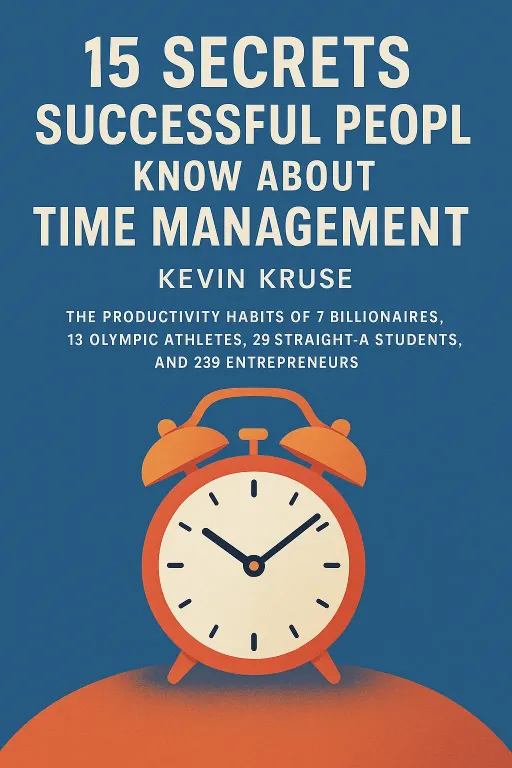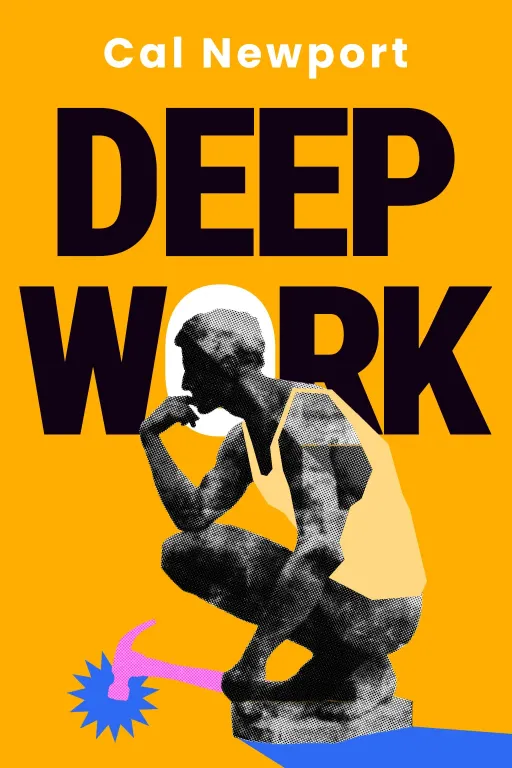
15 Secrets Successful People Know About Time Management
11 minThe Productivity Habits of 7 Billionaires, 13 Olympic Athletes, 29 Straight-A Students, and 239 Entrepreneurs
Introduction
Narrator: It’s 5:20 a.m. on a cold, dark New Jersey highway. A man, exhausted and overworked, is driving over 80 miles per hour, completely zoned out. He’s so lost in a fog of stress and sleep deprivation that he doesn’t even notice the state trooper he just flew past. The flashing lights in his rearview mirror are a brutal wake-up call. He was a successful entrepreneur, a master of to-do lists and productivity hacks, yet his life was spinning out of control. He was making dangerous mistakes, his health was suffering, and his personal relationships were crumbling. This moment of reckoning on the side of the road forced him to question everything he thought he knew about time management.
This experience belongs to Kevin Kruse, and it became the catalyst for his book, 15 Secrets Successful People Know About Time Management. After interviewing hundreds of billionaires, Olympic athletes, straight-A students, and entrepreneurs, Kruse discovered that the most productive people don’t rely on traditional methods. They don't just manage time; they manage their energy, priorities, and focus with a radically different mindset.
Productivity is a Matter of Energy, Not Time
Key Insight 1
Narrator: The first and most profound secret is a fundamental mindset shift. We are conditioned to think of time as the ultimate resource. Everyone gets the same 1,440 minutes in a day, and the goal of time management is to cram as much as possible into them. However, Kruse’s research reveals that this is a flawed approach. Highly successful people understand that the true currency of productivity isn't time; it's energy and focus. An hour of work when you are energized, focused, and creative is worth five hours of exhausted, distracted effort.
Kruse points to the story of writer Monica Leonelle, who was struggling with her productivity. She tracked her writing and found she was only producing about 500 words per hour, far below the industry standard. Initially, she tried traditional time management tactics like minimizing distractions, but the results were minimal. The real breakthrough came when she stopped focusing on managing her time and started managing her energy. She noticed her writing was faster and easier in the mornings. So, she began experimenting with strategies to boost her energy, such as working in short, 25-minute sprints followed by 5-minute breaks. She even switched from typing to dictating her novels while walking outside. By focusing on what energized her, Monica transformed her output, increasing her writing speed from 600 to an incredible 3,500 words per hour. Her story illustrates that managing your energy—through sleep, nutrition, exercise, and strategic breaks—is the foundation upon which all other productivity secrets are built.
Ditch the To-Do List and Live by Your Calendar
Key Insight 2
Narrator: For decades, the to-do list has been the sacred tool of the organized. Yet, Kruse argues it’s one of the least effective systems for getting things done. He cites research showing that a staggering 41% of items on a to-do list are never completed. They become a source of stress and guilt—a nagging list of unfulfilled wishes. This is due to a psychological phenomenon known as the Zeigarnik effect, where unfinished tasks linger in our minds, causing intrusive thoughts and anxiety.
Ultra-productive people don't use to-do lists. Instead, they live and die by their calendar. They schedule everything, from critical work projects to workouts, family dinners, and even buffer time for thinking. This practice, known as time blocking, has two powerful benefits. First, it forces you to assign a specific time and duration to a task, which dramatically increases the likelihood of its completion. Second, by scheduling a task, you offload it from your mind, freeing up cognitive resources. Jordan Harbinger, co-founder of The Art of Charm, schedules his entire day in 15-minute blocks. He says, "If it's not on the calendar, it doesn't get done. If it's on the calendar, it gets done no matter what." This isn't about creating a rigid, joyless schedule; it's about making intentional decisions about what matters and giving those priorities a specific home in your week.
Identify Your One Most Important Task (MIT) and Protect It
Key Insight 3
Narrator: In a world of endless demands, it’s easy to confuse being busy with being effective. Successful people understand the difference. They know that not all tasks are created equal. They consistently ask themselves: "What is the one thing that will have the biggest impact on achieving my goals?" This becomes their Most Important Task, or MIT. The secret is not just to identify the MIT, but to schedule it and protect that time fiercely, ideally during the first few hours of the day when willpower and cognitive function are at their peak.
Briana Scurry, a two-time Olympic gold medalist goalkeeper, provides a powerful example. In the six months leading up to the Olympics, she filtered every decision through a single question: "Will this activity help me perform better and therefore help us win gold?" This simple, clarifying question guided all her choices, from what she ate to when she went to bed. It allowed her to align her daily actions with her ultimate vision, ensuring that her most precious resource—her energy—was spent on what mattered most. This intense focus on the MIT is what separates mere efficiency (doing things right) from true effectiveness (doing the right things).
Capture Fleeting Ideas and Commitments in a Notebook
Key Insight 4
Narrator: Richard Branson, the billionaire founder of the Virgin Group, was once asked what his most important item was. His answer wasn't a smartphone or a laptop; it was a simple, pocket-sized notebook. He claims he could not have built his empire of over 400 companies without it. This highlights a secret shared by many high achievers: they capture everything. They don't trust their brains to remember ideas, meeting notes, or commitments. They write it all down.
This habit isn't just about preventing forgetfulness; it's about freeing the mind. When you try to hold everything in your head, you create mental clutter that drains your energy and prevents deep focus. By externalizing thoughts into a trusted system, like a notebook, you liberate your mind to do what it does best: think, create, and solve problems. Greek shipping magnate Aristotle Onassis called this his "million-dollar lesson," advising people to write everything down—ideas, information about new people, interesting things they hear. The act of writing it down prompts action and prevents valuable insights from vanishing. In an age of digital distraction, the simple act of carrying and using a notebook remains one of the most powerful productivity tools available.
Master the Art of Strategic Quitting by Saying 'No' and Delegating
Key Insight 5
Narrator: Warren Buffett once said, "The difference between successful people and very successful people is that very successful people say 'no' to almost everything." Every time you say "yes" to a request, you are implicitly saying "no" to something else—often your own priorities. Successful people are ruthless in protecting their time and focus. They say "no" to distractions, low-impact meetings, and requests that don't align with their goals.
Beyond saying "no," they master the art of delegation. They constantly ask the "3 Harvard Questions" for any task: Can I drop it? If not, can I delegate it? If not, how can I redesign it to be more efficient? This leads to a powerful realization: you should only do what only you can do. Kruse shares the provocative story of a programmer named Bob who was caught outsourcing his entire job to a developer in China for a fraction of his salary. While Bob was fired, Kruse argues the company missed the point. Bob had created a perfect system of leverage. The lesson is to aggressively delegate or outsource any task that you aren't uniquely skilled at or don't enjoy. This frees up your time and energy to focus on the high-leverage activities that truly drive results.
Conclusion
Narrator: Ultimately, 15 Secrets Successful People Know About Time Management delivers a powerful message: true productivity is not about becoming a more efficient machine. It's about becoming a more intentional human. The book's core principles can be distilled into the E-3C system: prioritize your Energy first; Capture everything in a notebook; live by your Calendar, not a to-do list; and Concentrate on your single most important task.
The most challenging idea in the book is that the feeling of being "crazy busy" is a choice. It’s a result of failing to set priorities and protect them. The secrets Kruse shares are not just hacks; they are habits that require discipline. They challenge you to stop reacting to the world's demands and start designing your life around what truly matters. The real question the book leaves you with is not how you can get more done, but what you will do with the 1,440 minutes you are given today to move closer to the life you want to live.









